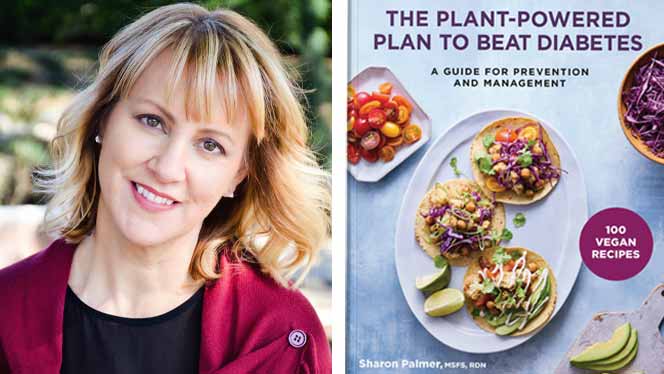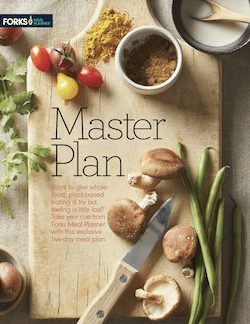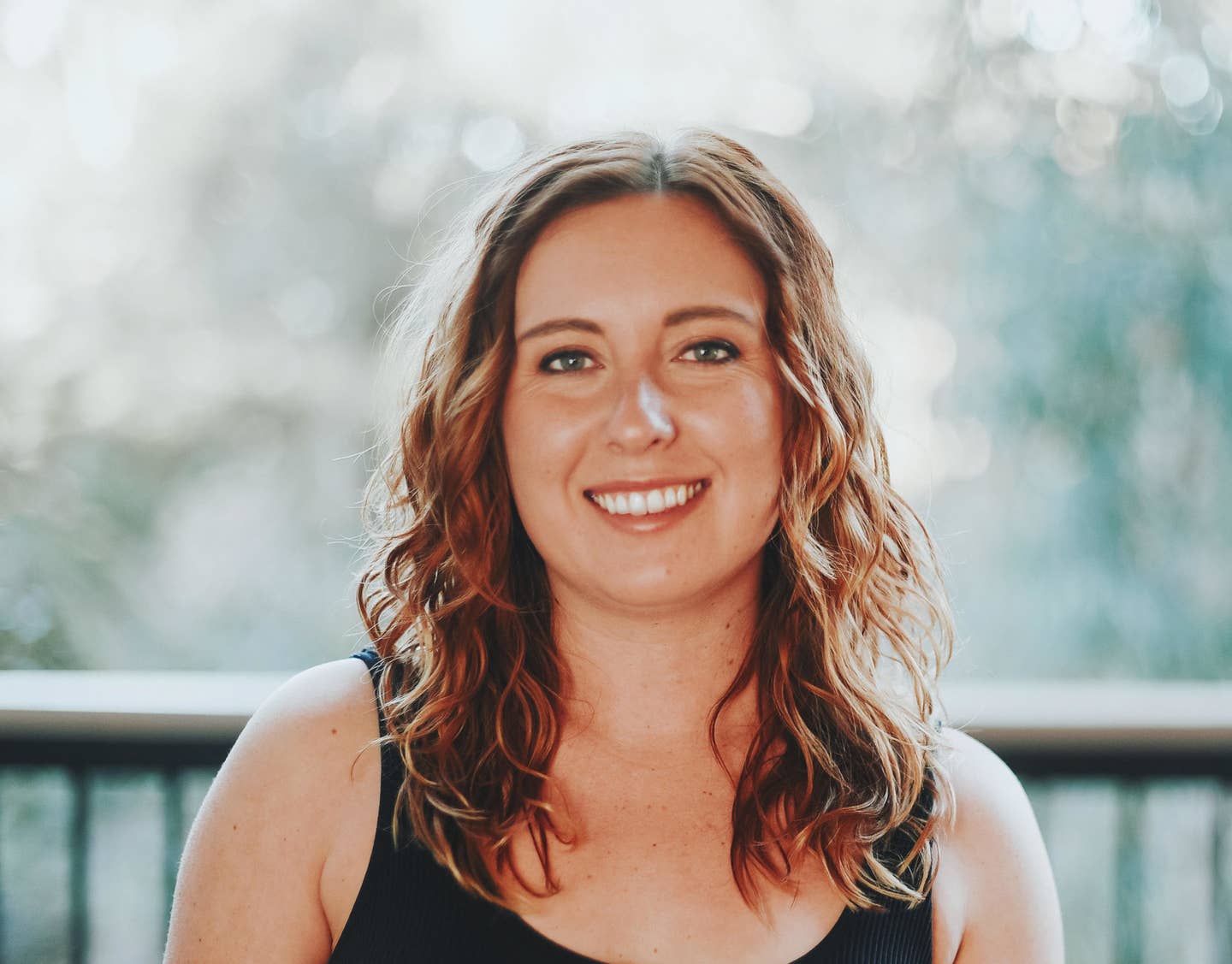
Beating Diabetes with Diet: Sharon Palmer’s New Guide Provides an Approachable Plant-Based Plan
Sharon Palmer (aka The Plant-Powered Dietitian) is beloved for her engaging plant-based cookbooks and blog, which are backed up by several decades of experience working as a registered dietitian nutritionist. Her brand-new release, The Plant-Powered Plan to Beat Diabetes: A Guide for Prevention and Management, dives into the ever-growing research around the benefits of veganism for managing diabetes and provides 100 delicious, nutritious plant-based recipes. By breaking down the latest science into digestible summaries and grounding the research with easy-to-implement advice and easy-to-follow recipes, Palmer offers a wealth of resources to anyone interested in taking charge of their health. Forks Over Knives chatted with Palmer about her longtime passion for food sustainability, how living in a Blue Zone impacted her perspective on diet, and why a plant-based lifestyle can be a game-changer for more than 130 million Americans living with diabetes and prediabetes.
How did your upbringing influence your interest in plant-based diets?
Sharon Palmer: My parents both came from farming families, which meant that we grew a lot of our own food when I was young. We had a huge garden, we canned and preserved things, we made homemade bread—nothing came in a package. I was interested in nutrition and health from a young age, so I went through the plant-based nutrition program at Loma Linda University in California. The people in [Loma Linda] are one of the longest-living populations in the U.S., and it was later designated a Blue Zone. I wasn’t vegan right off the bat, though. I was a pescatarian after college, and then I was a lacto-ovo vegetarian, and then I went vegan in 2011. As a dietitian writing about the benefits of a plant-based diet, I felt like I needed to do it for my research, and it really was a turning point for me because I realized it wasn’t hard to maintain. I felt amazing, and I knew this way of eating had the best outcome for my health, for the environment, and for animal welfare.
What changes did you notice in your own health after going vegan?
SP: I felt really light, like my body wasn't weighed down, and my digestion was more effective. And now here I am at my age, and I have such great health markers. My blood pressure is low, my blood cholesterol is low, and my inflammatory markers are low. I'm getting older now, and I’m not dealing with all the things that most women [my age] are already being treated for. I believe eating plant-based really lowered my risk for developing chronic disease.
As an RDN, what has been your experience with treating diabetes?
SP: Throughout my 20-year career as a dietitian I saw an enormous amount of patients with diabetes. And the number has just been increasing over the years. We used to call Type 2 diabetes “adult-onset diabetes” because it typically happened after someone turned 40, but now it's happening much earlier. It’s an epidemic. And it’s not just a problem for people who already have diabetes: There’s also a huge amount of people who have prediabetes or are dangerously close to it. So I feel like when we talk about preventing diabetes, it's a concern the majority of us need to consider. The cool part about lifestyle intervention is that what's good for diabetes is also what's good for your heart, your brain, your kidneys, your liver—it's good for everything. Going plant-based is not just a diabetes-specific diet. We should all be eating like this.
How did you prepare for writing your new book?
SP: I did a ton of research, a literature review, and I attended as many conferences as I could on the subject before sitting down to write. I interviewed colleagues and scientists who are leading the way with published research in this arena. For example, Neal Barnard’s research found that vegan diet could increase beta cell function, improve insulin [sensitivity], and facilitate better blood glucose levels for people who already had Type 2 diabetes. He also found that diabetics patients who were on oral medications and/or insulin were able to get off their meds after 25 days on his program. But diabetes is so particular; each individual responds to certain treatments and medications and programs differently, so my book isn’t a one-size-fits-all prescription. It includes a lot of information about the power of plant-based diets and provides different strategies so people can adjust it to meet their own needs. It would be great to use in conjunction with your healthcare professional so you can develop a personalized plan.
What are the most important elements you think about when creating and testing new recipes?
SP: I test all my recipes at home in the kitchen. I am constantly thinking of new ideas. A big inspiration for me are the seasons, what's fresh and available in the stores. I'm a big advocate of local foods, sustainable foods, and shopping at the farmers market. When I’m creating recipes I'm thinking, “Are these ingredients in season together, and what kind of flavors would go best with them?” I also try to make sure all the recipes are approachable, affordable, and that they call for ingredients you can find in any typical grocery store.
Are your recipes oil-free?
SP: I use a small amount of oil in my recipes, but not all of my recipes. It’s very easy to omit the oil to make it fit with your specific dietary needs.
You have a master’s degree in food sustainability. How does that inform your work?
SP: I've always been fascinated with how food grows, and how we're taking care of the environment through the things we eat. I studied at Green Mountain College in Vermont for two years looking at the entire food system and how it impacts the planet. It not only further informed my knowledge on the eco-friendly benefits of plant-based diets, but it also highlighted the nuances in our food system around feeding an ever-growing population and how to curb climate change. I co-founded an organization called Food and Planet, which has a goal of empowering health care professionals to advance sustainable food systems. Our mission is to educate health care professionals so they can function as a trusted touchpoint for explaining to consumers how to eat more sustainably. This could include topics like what to buy at the grocery store, how to know where your food comes from, how to reduce food waste, etc.
What would you say to someone who wants to go plant-based to manage their diabetes but isn’t sure how to start?
SP: I would let them know that this is such a holistic diet for your whole body, and the research in this area is continuing to grow. When you have diabetes you really have to take care of your body more than the average person, so you have to work a little bit harder. Your health care professional is a key piece of managing the disease, but the most important thing you can do for your health is to take care of yourself every single day. What you're eating, how you're moving, whether you’re reducing stress—all these things are part of a holistic lifestyle. And that's powerful because it means that you have control over your own health. I also hear from a lot of people who are contemplating going plant-based that they’re afraid they will miss something. But there are over 20,000 edible species of plants on the planet, and those are the ingredients that add the color and texture and aroma to your plate. Because there's such amazing diversity in the plant world you're not going to have less, you're going to have more.
Try Sharon Palmer's Raw Purple Power Salad recipe, excerpted from The Plant-Powered Plan to Beat Diabetes!
Free Download
Free 5-day meal plan!
Get a taste for healthy, fuss-free meal planning with this free five-day meal plan from Forks Meal Planner!
By providing your email address, you consent to receive newsletter emails from Forks Over Knives. We value your privacy and will keep your email address safe. You may unsubscribe from our emails at any time.

About the Author

About the Author
Megan Edwards
Join our mailing list
Get free recipes and the latest info on living a happy, healthy plant-based lifestyle.
By providing your email address, you consent to receive newsletter emails from Forks Over Knives. We value your privacy and will keep your email address safe. You may unsubscribe from our emails at any time.
